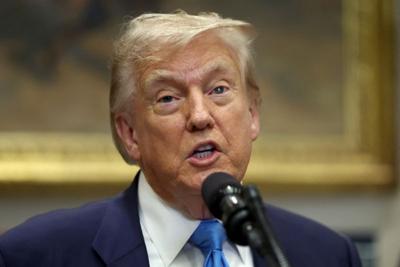Former President Donald Trump recently articulated his distinct perspective on the economic ties between the United States and other global powers, specifically highlighting the limited scope of commerce with India and Russia. His remarks underscore a recurring theme in his Economic Policy: a focus on perceived imbalances in International Trade relationships. These statements, delivered through social media, quickly garnered attention, offering a glimpse into his strategic thinking on global commerce and US Foreign Relations.
In a recent declaration, Mr. Trump asserted that the United States conducts “very little business” with India, and practically “almost none” with Russia. This assessment sets a clear tone for his views on the economic engagement with these nations, emphasizing a need for re-evaluation or realignment of existing trade frameworks. Such pronouncements often precede significant policy discussions, shaping the narrative around America’s economic posture.
Further elaborating on his position, Mr. Trump conveyed a striking indifference towards India’s ongoing economic dealings with Russia. Through a post on his Truth Social platform, he stated, “I don’t care what India does with Russia,” adding a pointed comment about their economies. This unfiltered commentary highlights his non-interventionist stance on certain bilateral economic partnerships, particularly when they do not directly align with his envisioned American International Trade priorities.
These recent comments follow closely on the heels of an earlier announcement made via Truth Social, wherein Mr. Trump indicated the United States’ intention to impose a substantial 25% Tariff on goods imported from India. This proposed measure signals a potential escalation in US India Trade relations, aiming to address what he perceives as unfavorable trade imbalances. The prospect of such significant Tariffs naturally sparks considerable debate among economists and policymakers.
The Indian government swiftly responded to the initial announcement regarding the proposed Tariffs, indicating a serious and thorough examination of the potential implications. Officials conveyed their steadfast commitment to negotiating and securing a mutually beneficial and fair trade agreement with the United States. This demonstrates India’s strategic approach to managing its US Foreign Relations and mitigating economic disruptions caused by trade policies.
Mr. Trump also voiced strong disapproval regarding India’s historical procurement of military equipment and energy resources primarily from Russia, deeming this practice “not good.” This critique intertwines International Trade with national security considerations, reflecting a broader geopolitical perspective on economic alliances. His remarks suggest a desire for India to diversify its defense and energy sourcing, potentially shifting towards American suppliers.
The implications of these statements extend beyond immediate trade figures, touching upon the intricate web of global alliances and economic dependencies. Mr. Trump’s Economic Policy during his previous tenure, and now his current commentary, consistently advocates for what he terms ‘America First’ principles, which prioritize domestic economic interests and challenge established global trade norms. This approach continues to define discussions around US Foreign Relations and bilateral agreements.
The ongoing dialogue surrounding US India Trade and the looming threat of new Tariffs represent a critical juncture in the economic relationship between these two nations. How these trade tensions evolve will undoubtedly influence regional stability and the broader landscape of International Trade. The future trajectory of these economic ties remains a subject of intense observation for analysts worldwide, particularly given Donald Trump’s influential voice in these matters.





Leave a Reply